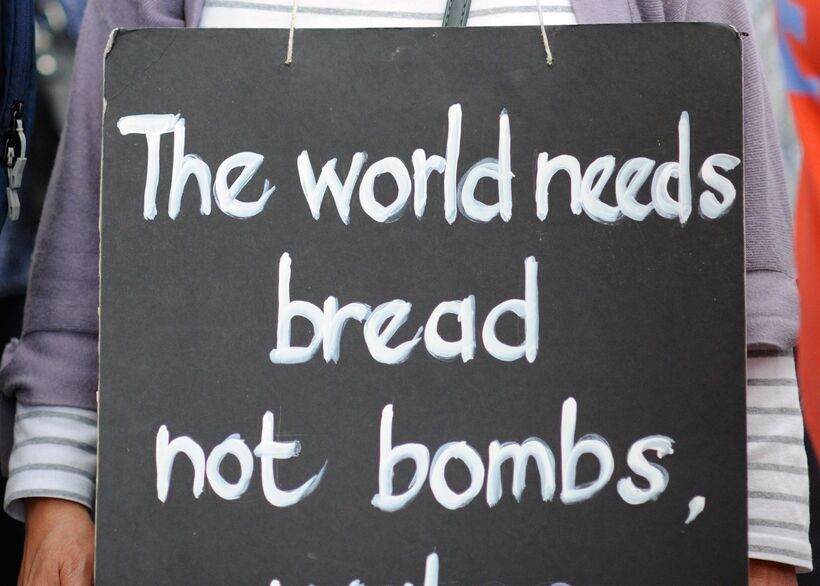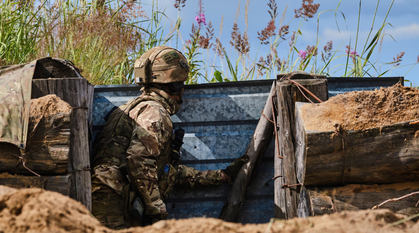Peace and the general election: where do the parties stand?
Dixe Wills looks at the political party manifestos in the upcoming general election. Where do they stand on building the foundations of a safer world?

Recently, I took advantage of a rare invitation to an event at the House of Commons to buttonhole the MP hosting it. The week before, I'd asked my colleagues if there was anything they'd like me to ask him. And so, amid the chink of wine glasses and the steady dispatch of canapés, I found myself enquiring of the honourable member, "What makes you feel safe?"
He was initially confused by the question – this was not the usual 'Why aren't you doing this about that?' that he was used to. I helped him out. "Is it," I prompted, "having a good local school and hospital etc…?"
The penny dropped and he fired off a few examples of what made him feel safe, his family being particularly important. Knowing that he favoured a 50% increase in current spending on 'defence' (a problematic euphemism), I asked, "So why do you want to spend money on the military rather than on health, education, clean air etc?"
He immediately snapped back, "Because the first priority of any government is to keep its citizens safe."
And there's the crux of the problem: the natural reflex shared by so many of our politicians is to view 'security' exclusively in terms of the power of the nation's armed forces. Peacebuilding, a concept so dear to Quaker hearts, is neglected.
This general election Quakers in Britain are calling on the UK government to do three things on the issue of peace: redirect military spending to fund the foundations of a safer world; create a culture of peace and nonviolence through the education system; and use diplomacy to seek an end to the devastating conflict in Ukraine, and to demand a ceasefire in Gaza (working in the long-term for a just and sustainable peace in both cases).
To find out how likely those appeals are to receive a hearing, I trawled through the manifestos of the Conservatives, Labour, Liberal Democrats, Scottish National Party (SNP), Plaid Cymru, Green Party and Reform.
Military spending
On the question of military spending, the Conservatives propose a rise from 2 to 2.5% of GDP by 2030. They also advocate for "at least £10 billion of investment in munitions production" and a form of National Service.
Labour make the same 2.5% pledge, albeit merely reaching it "as soon as possible". The "ambition" of the Lib Dems is to spend "at least 2.5% of GDP on defence" [my italics]. Reform, meanwhile, would aim to get to 2.5% by 2027, increasing spending to 3% by 2030.
There are three parties that appear not to share this commitment to increasing military budgets: the SNP, Plaid Cymru and the Green Party. They're also the only parties in favour of dismantling the Trident nuclear missile system (which is not a devolved issue). The SNP don't give a figure for spending but promise to "scrap Trident and invest the money into conventional defence and public services". Plaid "oppose increasing defence spending" and that "it would be better used on conventional defence and to peaceful ends". The Green Party don't mention an overall military budget, concentrating instead on "cancelling the Trident programme and removing all foreign nuclear weapons from UK soil".
Keir Starmer has been at pains to point out that his "commitment to the nuclear deterrent is absolute". However, this pledge runs contrary to the UK's obligations under the Treaty on the Non-Proliferation of Nuclear Weapons, which requires signatories to engage with negotiations towards nuclear disarmament in good faith. Starmer had the candour to add that, "Of course that means we have to be prepared to use it," though didn't paint a picture of what the world might look like after he (and presumably others) had pressed the button.
The Tories declare they will "always be steadfast" in their support of Trident; the Lib Dems want to maintain nuclear missiles "while pursuing multilateral global disarmament".
A just and sustainable peace
Support for Ukraine is pledged in all the manifestos except Reform's, which makes no mention of the war. However, Plaid Cymru and the Green Party do not specify military support.
Turning to Gaza, while all parties (except Reform, who are silent on the issue) agree that peace would be a desirable outcome, there are dividing lines as to their urgency in achieving it. The Conservatives, for example, are alone in not calling for a ceasefire. They "staunchly stand behind Israel's right to defend itself" and "will recognise a Palestinian State at a time that is most conducive to the peace process". All the other parties (except Reform) support a two-state solution, with the SNP and Green Party also demanding an end to arms sales to Israel.
From a Quaker perspective, although there are some encouraging pointers towards peace, the majority of these political prospectuses make for gloomy reading. But this should encourage us not only to vote wisely, but also to make our voices heard with our prospective candidates and newly-elected MPs.
For instance, with our partners in the Rethinking Security network we're aiming to shift the narratives in the UK about what security is and how it's best achieved. Take a few minutes to read Rethinking Security's five-point general election guide (PDF) and our own general election pack. They're both essential reading at this time when wars seem all about us, and the solution too often proffered to the people is more war.
This is the third in a series of blogs examining the 2024 General Election manifestos. Read the first blog on democracy, human rights and migration and the second on climate justice priorities.


